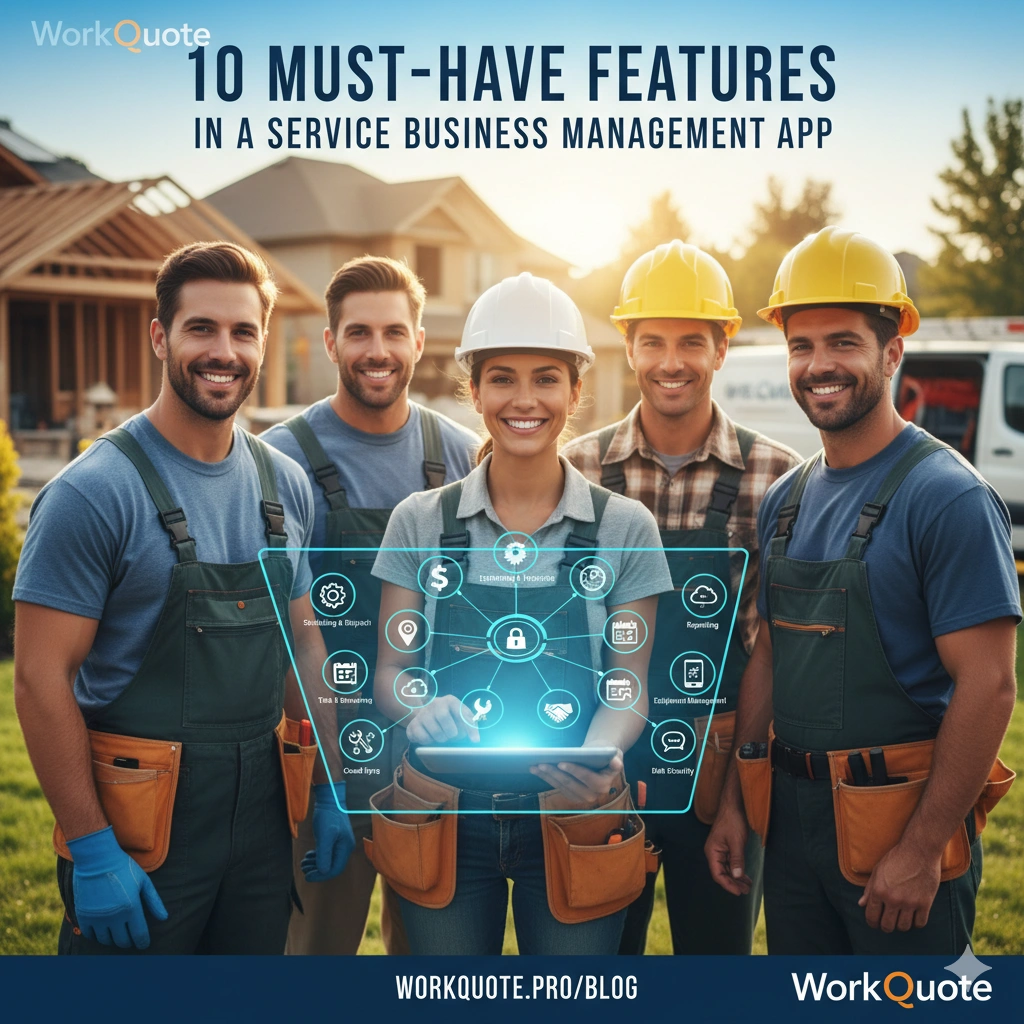
Discover the essential features every service business management app should include to streamline operations, boost productivity, and grow your business effectively.
Running a service business requires juggling multiple tasks simultaneously—from creating estimates and scheduling appointments to invoicing clients and tracking expenses. The right business management app can transform how you operate, turning chaos into organized efficiency. Whether you're a solo freelancer, small business owner, or managing a growing service team, choosing an app with the right features is crucial for success.
Modern service businesses need more than basic scheduling tools. They require comprehensive solutions that handle every aspect of business operations while remaining user-friendly and accessible. Let's explore the ten essential features that separate exceptional service business management apps from the rest.
1. Comprehensive Estimate and Quote Creation
Professional estimates form the foundation of successful service businesses. Your management app should offer robust estimate creation tools that allow you to build detailed, customized quotes quickly and efficiently.
Look for apps that provide customizable templates, itemized pricing options, and the ability to include photos, descriptions, and terms. The best systems allow you to create estimates on-site using mobile devices, send them instantly to clients, and track their status in real-time.
Advanced estimate features include automatic calculations, tax handling, discount applications, and multiple pricing tiers. Some apps even offer estimate approval workflows and digital signature capabilities, streamlining the entire proposal process from creation to acceptance.
2. Intelligent Job Scheduling and Calendar Management
Effective scheduling prevents double-bookings, optimizes route planning, and ensures efficient resource allocation. Your service business app should feature an intuitive calendar system that handles complex scheduling scenarios with ease.
Essential scheduling features include drag-and-drop appointment management, recurring job setup, team member assignment, and automated scheduling based on availability. The system should also handle different job types, duration estimates, and travel time calculations.
Integration with popular calendar platforms ensures your schedule stays synchronized across all devices and team members. Push notifications and reminders help prevent missed appointments while automated client confirmations reduce no-shows significantly.
3. Automated Invoicing and Payment Processing
Cash flow management becomes effortless with automated invoicing capabilities. Your app should generate professional invoices automatically upon job completion, send them to clients instantly, and track payment status comprehensively.
Key invoicing features include customizable invoice templates, automatic late payment reminders, recurring billing for ongoing services, and detailed payment tracking. The system should handle various payment methods including credit cards, bank transfers, and digital wallets.
Integration with accounting software streamlines financial record-keeping while automated payment processing reduces administrative overhead. Look for apps that offer secure payment gateways and comply with industry security standards.
4. Comprehensive Client Management System
Strong client relationships drive business growth. Your management app should include a robust customer relationship management (CRM) system that stores detailed client information, service history, and communication records.
Essential CRM features include contact management, service history tracking, client notes and preferences, and communication logs. The system should also handle multiple contact persons per client and maintain detailed property or project information.
Advanced client management includes automated follow-up sequences, birthday and anniversary reminders, and client satisfaction surveys. These features help maintain strong relationships and encourage repeat business through personalized service delivery.
5. Real-Time Business Analytics and Reporting
Data-driven decisions lead to business growth. Your service management app should provide comprehensive analytics that offer insights into revenue trends, client behavior, employee performance, and operational efficiency.
Essential reporting features include revenue tracking, job completion rates, client acquisition costs, and profit margin analysis. The system should generate both summary dashboards and detailed reports that help identify growth opportunities and operational bottlenecks.
Advanced analytics include predictive forecasting, seasonal trend analysis, and performance benchmarking. According to Salesforce research, businesses using analytics are significantly more likely to outperform competitors and achieve sustainable growth.
6. Expense Tracking and Financial Management
Profitability depends on accurate expense tracking and financial oversight. Your app should include comprehensive expense management tools that capture all business costs and integrate seamlessly with invoicing and reporting systems.
Key expense features include receipt capture through mobile photography, automatic categorization, mileage tracking, and integration with bank accounts and credit cards. The system should also handle employee expense submissions and approval workflows.
Advanced financial management includes profit and loss statements, cash flow projections, and tax preparation support. These features provide complete financial visibility and simplify accounting processes significantly.
7. Mobile Accessibility and Offline Functionality
Service businesses operate in the field, making mobile accessibility absolutely essential. Your management app should function seamlessly across smartphones and tablets while maintaining full functionality even without internet connectivity.
Critical mobile features include responsive design, offline data access, and automatic synchronization when connectivity returns. The app should allow complete job management from mobile devices including estimate creation, job updates, and payment collection.
Advanced mobile capabilities include GPS tracking for mileage and location verification, photo documentation, and electronic signature collection. These features enable complete business management from anywhere, increasing efficiency and client satisfaction.
8. Team Collaboration and Communication Tools
Growing service businesses require effective team coordination. Your app should include collaboration features that keep team members informed, aligned, and productive regardless of their location.
Essential collaboration features include job assignment and tracking, internal messaging, file sharing, and real-time updates. The system should also handle different user roles and permissions to maintain security while enabling appropriate access.
Advanced team features include time tracking, performance monitoring, and automated task assignments based on skills and availability. These capabilities ensure optimal resource utilization and consistent service delivery across your entire team.
9. Integration Capabilities with Third-Party Tools
Modern businesses use multiple software solutions, making integration capabilities crucial for operational efficiency. Your service management app should connect seamlessly with accounting software, marketing platforms, and other business tools.
Important integrations include QuickBooks or similar accounting platforms, email marketing services, payment processors, and calendar applications. The system should also support API connections for custom integrations with specialized industry tools.
According to Zapier's integration research, businesses using connected software solutions report significantly higher productivity and reduced manual data entry errors.
10. Scalability and Customization Options
Your business will grow and evolve, requiring software that adapts accordingly. Your management app should offer scalable pricing plans and customization options that accommodate changing needs without requiring complete system changes.
Key scalability features include flexible user limits, additional feature modules, and industry-specific customizations. The system should handle increased data volumes and user activity without performance degradation.
Advanced customization includes custom fields, workflow automation, and branded client communications. These features ensure the app grows with your business while maintaining the specific functionality your industry requires.
Choosing the Right Service Business Management App
Selecting the perfect service business management app requires careful consideration of your specific needs, budget, and growth plans. Start by identifying your most critical pain points and prioritizing features that address these challenges directly.
Consider apps that offer free trials or demonstrations, allowing you to test functionality with real business scenarios. Pay attention to user interface design, learning curve requirements, and customer support quality during your evaluation process.
Remember that the best app for your business combines essential features with ease of use, reliable performance, and reasonable pricing. The investment in comprehensive business management software typically pays for itself through increased efficiency, reduced errors, and improved client satisfaction.
Modern service businesses require sophisticated tools to compete effectively and grow sustainably. By choosing an app with these ten essential features, you'll be well-equipped to streamline operations, delight clients, and achieve your business goals efficiently.

